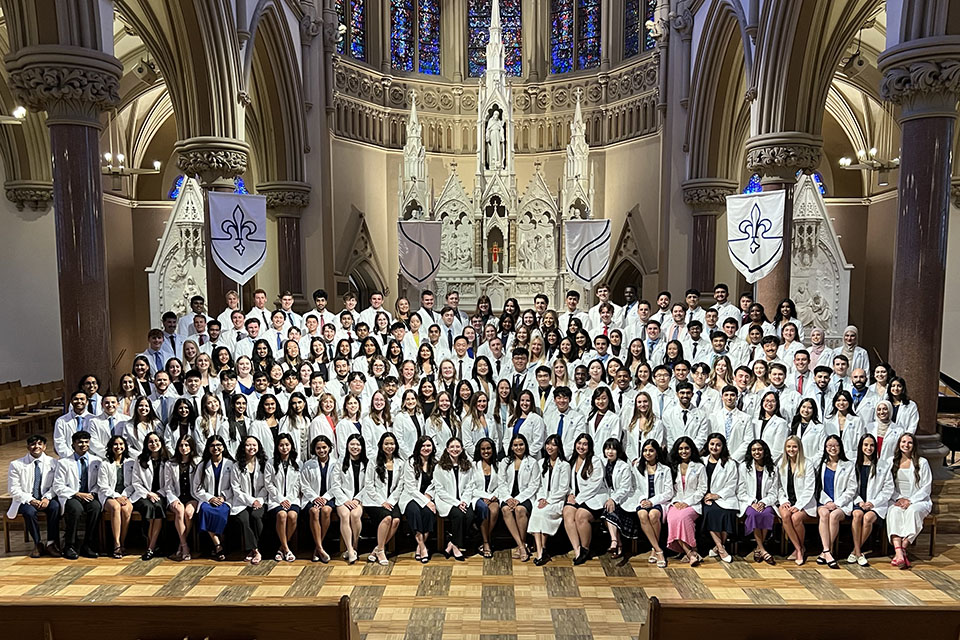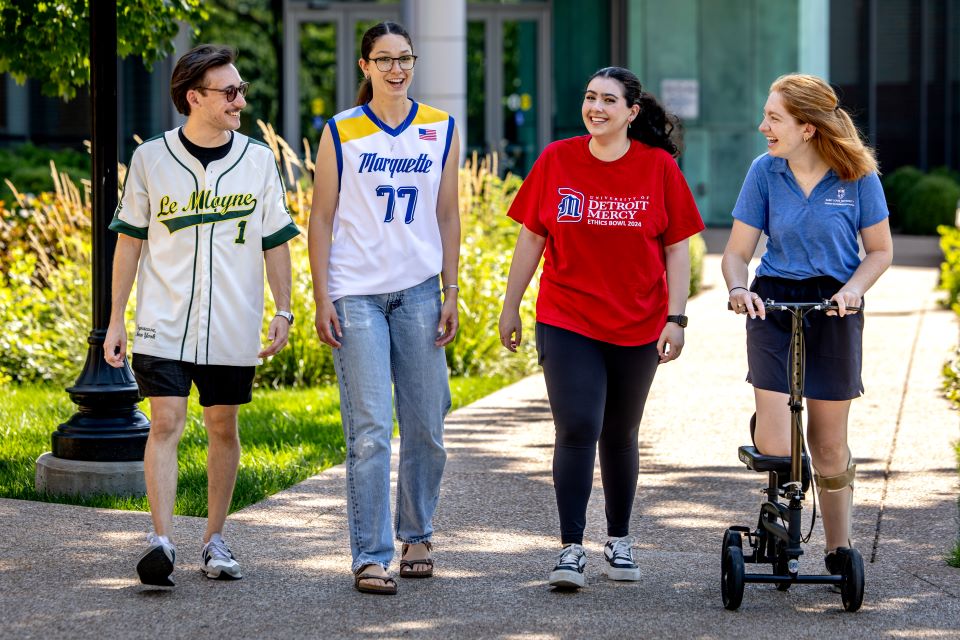Missourians Settle the Missour-ee, Missour-uh Debate
10/17/2023
Missouri Voters in a 2023 SLU/YouGov Poll Overwhelmingly Say Missour-ee
Politicians have crisscrossed the state for years, sharing their vision for Missour-ee or Missour-uh, depending on where they spoke. Now, as the state celebrates Missouri Day on Wednesday, Missourians have spoken about how they say their state’s name.

The Missouri state flag flies on the campus of Saint Louis University. Photo by Joe Barker.
In 2023, the SLU/YouGov Poll interviewed 900 likely Missouri voters, asking how they pronounced the name of the state in which they reside. The poll found that only 9.5 percent of Missourians say they live in Missour-uh. More than 90 percent of those polled say they live in Missour-ee.
“After growing up in Missouri, I was surprised so few Missouri voters used the Missour-uh pronunciation,” said Steven Rogers, Ph.D., SLU/YouGov Poll Director and associate professor of political science at SLU. “Using Missour-uh appears to be partly generational. Sixteen percent of voters who are 65 years old or older said Missour-uh, but only 3 percent of voters below the age of 29 said Missour-uh.”
Fifteen percent of voters in Northwest Missouri indicated they used the Missour-uh pronunciation, but only 6 percent of St. Louis voters said Missour-uh.
“Very conservative” or “Conservative” voters were approximately 4.5 percent more likely to say Missour-uh than “Very liberal” or “liberal voters. Differences between how men and women, urban and rural voters, gun owners, or Democrats and Republicans said the state’s name, however, fell within the margin of error.
“Variation is ingrained in all languages, and there is nothing inherently ‘better’ about one way of pronouncing something over another,” said Christina Garcia, Ph.D., an associate professor of Spanish in Saint Louis University’s Department of Languages, Literatures and Cultures. “However, society creates associations between different forms of speaking and social characteristics, both positive and negative. Since Missour-ee carries prestige in this case, it is likely that Missourians may be under-reporting their use of Missour-uh.”
“These subtle differences are what make each dialect unique, and it is our job as linguists to highlight and celebrate them,” said Garcia.
Poll results and cross tabs available here.
Asking Missourians about their state’s name
In February 2023, 900 survey respondents were played two audio recordings, where a man or woman said Missour-ee and Missour-uh. Poll directors employed Garcia to help select the recordings of the state name to be used. As a phonetician and sociolinguist, García specializes in variation in pronunciation and made sure the recordings matched in terms of intonation and intensity and only differed in whether Missour-ee or Missour-uh was said.
Respondents were then asked, “How do you pronounce Missouri?” and selected one of the recordings. The order of the recordings and whether the respondent heard a man or woman’s voice was randomized.
The margin of error for the full survey sample is ± 3.72%.
History of Missour-ee and Missour-uh
Determining the “correct” pronunciation of Missouri has stumped historians for decades.
Researchers have made efforts to determine which pronunciation Missourians genuinely favor. The Missouri Division of Tourism identifies two polls from 1976 and 1989 by AAA Midwest Motorist. From 1976 to 1989, those favoring ‘Missour-ee’ increased from 60 percent to 66 percent. Similar to the SLU/YouGov Poll, these AAA polls found that northwestern Missourians were most likely to use the “Missour-uh” pronunciation.
Another survey was completed at the 2002 State Fair by then-Secretary of State Matt Blunt. Fair goers responded with an overwhelming 74 percent favoring the ‘Missour-ee’ pronunciation and only 26 percent preferring ‘Missour-uh.’
Methodology and Funding
YouGov interviewed 900 likely Missouri voters between Feb. 8-14, 2023. The YouGov panel, a proprietary opt-in survey panel, is comprised of 3.1 million United States residents who have agreed to participate in YouGov Web surveys. Using their gender, age, race, and education, YouGov weighted the set of survey respondents to known characteristics of Missouri voters from the American Community Survey (ACS) public use microdata file, public voter file records, the 2020 Current Population Survey (CPS) Voting and Registration supplements, the 2020 National Election Pool (NEP) exit poll, and the 2020 CES surveys, including demographics and 2020 presidential vote. The margin of error for the weighted data is 3.72%.
The February 2023 SLU/YouGov Poll was funded by the PRiME Center in SLU’s School of Education.
About YouGov
Saint Louis University has partnered with YouGov to conduct its annual survey of Missouri voters. YouGov conducts surveys for multiple academic institutions and is the primary, trusted survey firm for media organizations, including CBS News and The Economist. An independent Pew Research Center study of online survey firms in 2016 further concluded that YouGov “consistently outperforms competitors.”
About Saint Louis University
Founded in 1818, Saint Louis University is one of the nation’s oldest and most prestigious Catholic institutions. Rooted in Jesuit values and its pioneering history as the first university west of the Mississippi River, SLU offers more than 13,500 students a rigorous, transformative education of the whole person. At the core of the University’s diverse community of scholars is SLU’s service-focused mission, which challenges and prepares students to make the world a better, more just place.
Latest Newslink
- SLU Welcomes 175 New Medical Students at White Coat CeremonySaint Louis University’s School of Medicine marked a pivotal milestone for 175 incoming medical students at its annual White Coat Ceremony. On Sunday, July 27, faculty, family, and friends convened at St. Francis Xavier College Church to honor the students' achievements and their forthcoming pledge to the medical profession.
- Saint Louis University Hosts National Jesuit Student Leadership ConferenceSaint Louis University hosted student government leaders from Jesuit colleges and universities on campus July 22-26. This was the first time SLU hosted the National Jesuit Student Leadership Conference.
- James Hitchcock, Ph.D.: 1938-2025James F. Hitchcock, Ph.D., professor emeritus of history, died Monday, July 14, 2025. He was 87. Hitchcock authored several books on the history of the Catholic Church.
- Lentine Receives Award of Merit for Outstanding Contributions to Scientific MedicineKrista Lentine, M.D., Ph.D., professor of medicine at Saint Louis University's School of Medicine, is the 2024 recipient of the St. Louis Metropolitan Medicine Society Award of Merit for Outstanding Contributions to Scientific Medicine.
- We Should Treat More People with Hepatitis B, SLU Expert SaysIn a pair of articles published in Lancet Gastroenterology and Hepatology, scientists lay out the case for why we should expand treatment recommendations for people with hepatitis B.
- Running Interference: Scientists Block Viral RNA, Aim to Cure Hepatitis BIn a recent paper published in Science Translational Medicine, a SLU scientist reports that a class of drugs called RNA interference (RNAi) therapeutics represent a major advancement in the treatment of chronic hepatitis B virus infections.













